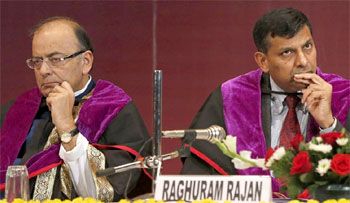 India plans to strip its central bank of authority to regulate government bonds but leave it in charge of other money market instruments, setting the stage for a confrontation with Reserve Bank of India governor Raghuram Rajan.
India plans to strip its central bank of authority to regulate government bonds but leave it in charge of other money market instruments, setting the stage for a confrontation with Reserve Bank of India governor Raghuram Rajan.
The move by Arun Jaitley's finance ministry is part of an overhaul intended to expand bond markets by attracting retail investors and improve the transmission of monetary policy, three government sources told Reuters.
What would be the biggest regulatory shakeup in a generation is expected to overshadow policy meetings this Sunday in New Delhi, which will be attended by Jaitley, Rajan and India's stock market regulator, whose powers stand to be enhanced.
"The objective is to push financial-sector reforms," one of the sources said on Wednesday, declining to be identified because he was not authorised to speak to the media. "You need a bond market that is well functioning, where retail and corporate investors can participate."
Changes proposed by Jaitley in his Feb. 28 budget triggered speculation that he was also looking to transfer money market regulation from the RBI to the Securities and Exchange Board of India (SEBI), the country's stock market regulator.
Together with a monetary policy pact announced after the budget, India would move towards leaving the RBI with a formal mandate to control inflation and oversee banks but without much of its market oversight.
Sources at the RBI have expressed concern over the shakeup. Rajan went on the record last year as saying the creation of a markets super-regulator would be "somewhat schizophrenic".
As an academic economist in the United States, Rajan advocated bundling regulation under one roof. But as India's top monetary official, he has changed his view, saying that such a step could be "too extreme".
"The government is keen on SEBI taking increased responsibilities," said a senior official at the capital market regulator, who also spoke on condition of anonymity. "The RBI is obviously very worried if they lose this. That takes away a critical part of their job."
The RBI had no immediate comment.
Bonds only
The government's thinking is that the change would help lower borrowing costs and resolve a conflict of interests the RBI now faces in targeting inflation and funding the government.
The government sources said, however, the plan was to only take the regulation of government bonds from the central bank.
"The RBI will continue to regulate all other monetary instruments," another source said.
Maintaining oversight of money markets would be crucial for the RBI. It would let it the central bank use short-term operations to ensure that its policy rates effectively influence the rate at which commercial banks lend to each other.
The amendments, which need to be approved by parliament, will also not take away the power of the RBI to set repo and reverse repo rates, India's main interest rate tools, the sources said.
The central bank would also be able to engage in its own trading in government securities as part of its market operations, they added.
The RBI currently requires banks to hold 21.5 percent of deposits in government bonds. They often hold more, making it harder to pass on to borrowers the RBI's two quarter-point cuts, which have lowered its key repo rate to 7.5 percent this year.
"It is part of a two-pronged strategy to make monetary policy more effective in India," said the first source. "First, we decided to go for inflation targeting, and now we are shifting government bonds out of the RBI's domain."
The official said the amendments were introduced in parliament, as part of the annual finance bill that is part of the budget, after consulting Rajan. "He supported all these changes," the official added.
However, in an about-turn, the officials said the RBI now opposed the changes, with deputy governor Urjit Patel voicing his objections at a meeting on Wednesday with Finance Secretary Rajiv Mehrishi.











